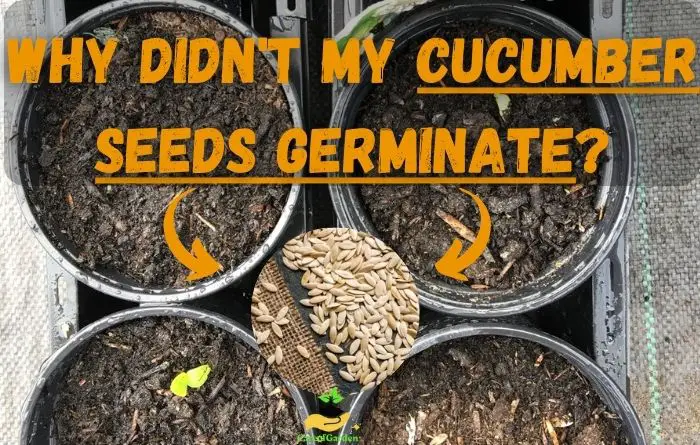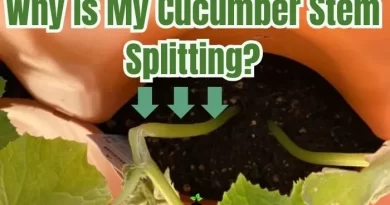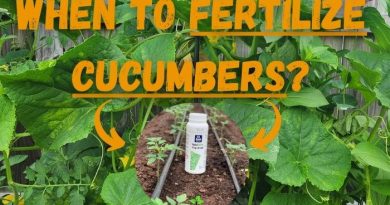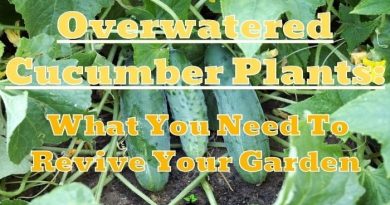Why Didn’t My Cucumber Seeds Germinate? (7 Simple Reasons)
Cucumbers are a popular vegetable for gardeners, but sometimes even the most experienced gardeners can have trouble getting their cucumber seeds to germinate. If you’re wondering why your cucumber seeds didn’t germinate, don’t worry – there are several common reasons why this happens.
Cucumber seeds may fail to germinate due to a variety of factors, including improper planting depth, old or low-quality seeds, overwatering, and low soil temperatures. To improve germination rates, plant cucumber seeds about 1 inch deep in loose, well-draining soil and keep the soil moist but not waterlogged. Additionally, use fresh, high-quality cucumber seeds and maintain warm soil temperatures between 70-90°F for best results.
In this article, we’ll explore the reasons why cucumber seeds fail to germinate and provide tips on how to prevent cucumber seed germination failure.
Reasons Why Cucumber Seeds Fail to Germinate
There are several reasons why cucumber seeds fail to germinate:
1. Soil is Too Dry
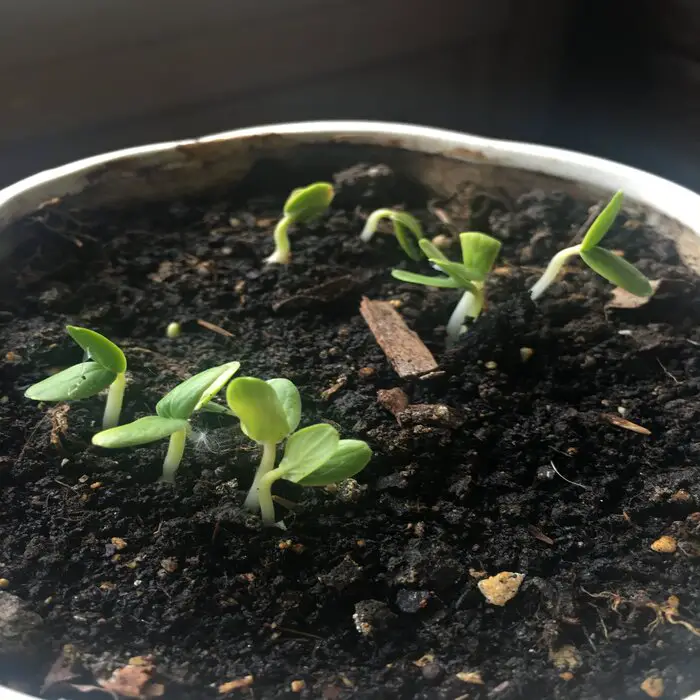
From my experience, the main reason why cucumber seeds fail to germinate is due to lack of moisture in the soil causing the soil to become dry.
When the soil becomes too dry it forms an impenetrable layer around the cucumber seed making it difficult for water to be absorbed and start the germination process. I know that insufficient moisture in the soil can slow down germination or cause the seeds to die completely.
This hardened layer of soil can cause problems, for your cucumber seeds as it prevents the emergence of cucumber seedlings. Typically this crust can be broken up by loosening the soil after watering. However, I advise you to do this only after the seedlings have started to appear.
Solution
To avoid this my recommendation is to make sure you thoroughly water the soil before you plant the cucumber seeds. It’s important to keep in mind that the water shouldn’t be too cold and the soil should be warm enough for planting.
Another way I try to enhance the soil structure and prevent a crust from forming, which could make it difficult for young plants to grow, is by adding organic matter such as humus and dolomite.
Additionally, if your soil is heavy, incorporating sand can also be beneficial. Lastly, using mulch on the soil can help retain moisture.
2. Improper Soil Temperature
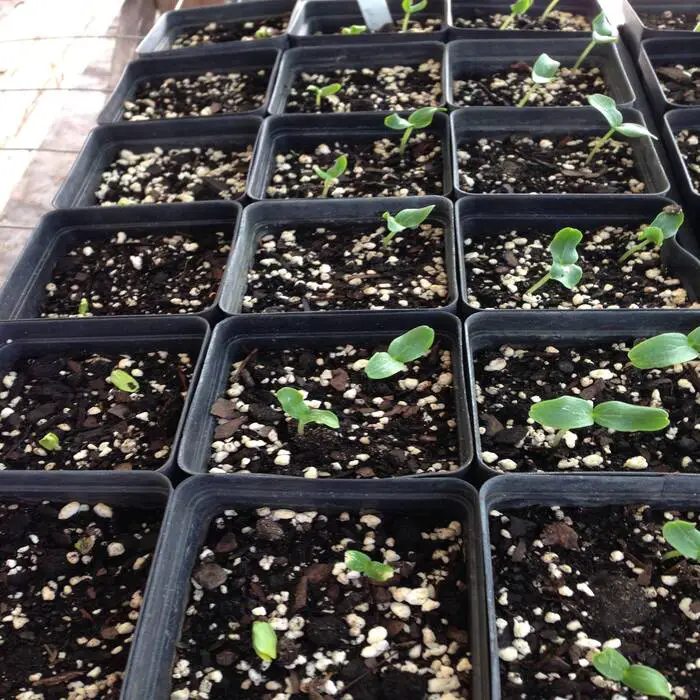
The second reason I know why cucumber seeds don’t sprout is because of improper soil temperature. Cucumber seeds require a specific temperature range to start their growth and if the soil is either too cold or too hot, they won’t be able to do so.
The optimal temperature range for cucumber seed germination is between 70 and 90 degrees Fahrenheit.
When the soil is too cold, it slows down the metabolism of the cucumber seed preventing it from absorbing the nutrients needed for germination.
On the other hand, if the soil is too hot, it can harm the seed and prevent the proper emergence of the seedling.
Solution
To ensure successful germination, it is important to monitor the temperature of the soil and adjust it as needed using a soil thermometer, heat mat, or shade cloth.
I recommended starting sowing cucumbers only after the frosts have passed and the soil gradually warms up, preferably after May 25th.
Here is a table I put together to show you when it’s time to sow cucumber seedlings based on soil temperature:
| Soil Temperature (°C) | Soil Temperature (°F) | Cucumber Seeds Germination State |
|---|---|---|
| Below +10 | Below +50 | No germination |
| +10 to +15 | +50 to +59 | Poor germination |
| +15 to +20 | +59 to +68 | Acceptable germination |
| +20 to +30 | +68 to +86 | Optimal germination |
| +30 to +35 | +86 to +95 | Low germination |
| Above +35 | Above +95 | No germination |
3. Old or Low-quality Cucumber Seeds
If your cucumber seeds are old or of low quality then they might struggle to germinate. If the seeds are stored incorrectly they may not be able to grow or have a low germination success rate.
Furthermore, aged or subpar seeds could potentially be damaged or have some diseases, making them incapable of germinating. To avoid this situation it is advisable for gardeners to only use high-quality cucumber seeds while also checking the expiration date before planting them.
Solution
I always try to store my cucumber seeds in a cool, dry place, avoiding moisture and high humidity. I advise you to do the same. Sealed packaging can protect the seeds from adverse environmental factors, but it is still important to store them in a suitable location.
Failure to comply with storage conditions can decrease germination rates. A cool, dark place, such as a refrigerator door, is suitable for storage. It is also important not to leave the package open, in a very warm room, or in direct sunlight.
4. Improper Seed Preparation
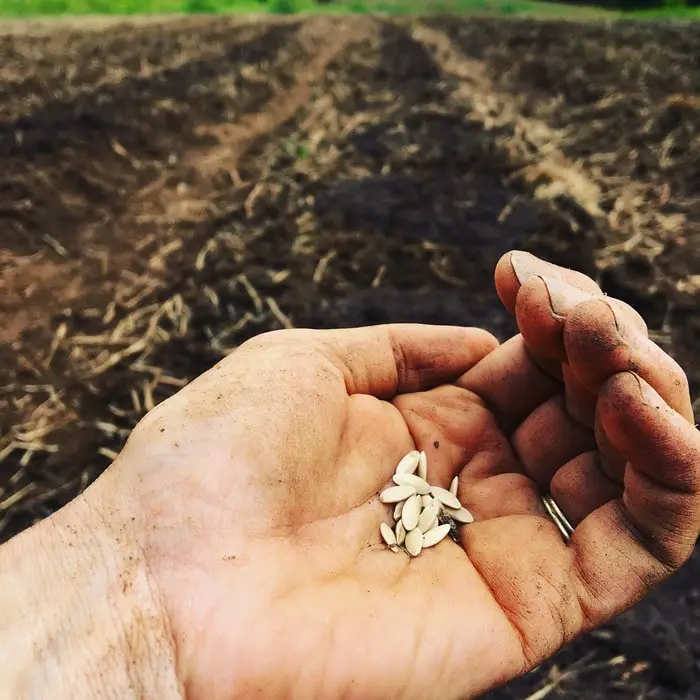
Another reason why cucumber seeds fail to germinate is due to improper seed preparation. I always heard other gardeners that they often use different methods of seed preparation that can affect their germination.
Soaking your cucumber seeds in a solution of potassium permanganate is a bad method that has been proven to decrease germination rates. Using too strong a concentration of potassium permanganate can even destroy the seeds completely.
Even though the seeds may not change outwardly, they will not sprout even under optimal conditions. After soaking, drying the seeds can also worsen their germination and growth.
Solution
To ensure fast and high-quality germination, I recommend planting cucumbers immediately after soaking. Most seeds are now treated by producers with all the necessary means for reliable germination and development, so additional soaking or chemical treatment at home is often unnecessary.
5. Incorrect Planting Depth of Seeds
When cucumber seeds are planted at the wrong depth can make them fail to germinate for these reasons:
- If the seeds are buried deeply they might not receive enough oxygen or sufficient moisture both of which are crucial for germination. Additionally, deep planting increases the risk of rot or fungal infections in the seeds due to moisture.
- Conversely, if you place the seeds too close to the surface they may dry out quickly and become more susceptible to damage by pests or environmental factors.
- Furthermore, inadequate depth of the seeds can render them unable to establish strong roots if they are not planted deep enough, which can make them more vulnerable to drought or other stresses.
Solution
Gardeners with experience suggest that a depth of 1.5 – 2 cm is enough for planting cucumber seeds. Planting seeds deeper than this may cause seedlings to appear much later or deteriorate due to lack of air and moisture.
Therefore, it is important to follow the recommended planting depth for cucumber seeds, typically around 1 inch deep, to ensure optimal germination and growth.
I have researched and compiled a table to help you plant your cucumber seeds at the right depth based on soil type:
| Soil Type | Ideal Cucumber Seed Planting Depth |
|---|---|
| Sandy Soil | 1 inch (2.5 cm) |
| Loam Soil | 1 inch (2.5 cm) |
| Clay Soil | 1/2 – 1 inch (1.27- 2.5 cm) |
| Raised Beds | 1 inch (2.5 cm) |
| Container | 1 inch (2.5 cm) |
| Hill Planting | 1-2 inches (2.5-5 cm) |
6. Poor Soil Quality
Cucumber seeds need soil that’s rich in nutrients to sprout and develop. If the quality of the soil is not good the seeds might struggle to absorb enough nutrients to begin the germination process.
The soil’s quality may be affected by factors such, as organic matter, low acidity levels, or a lack of essential nutrients. Additionally, if your garden soil is s too compacted, the roots will have difficulty penetrating it and absorbing the vital nutrients they need.
Solution
To improve soil quality, you can add compost or other organic matter to the soil before planting the seeds. This will help to improve soil structure, increase nutrient availability, and provide the seeds with the nutrients they need to germinate.
7. Pest Damage
Pests such as birds, rodents, and insects can damage cucumber seeds and prevent them from germinating. Pests can dig up the seeds, eat them, or damage them in other ways, making them unable to germinate.
Solution
What I do to protect cucumber seeds after I sow them is cover the soil with a layer of netting or use pest control measures such as traps or repellents.
If you’re using netting, make sure to secure it tightly to the ground to prevent pests from digging under it. If you’re using traps or repellents, make sure to follow the instructions carefully to avoid harming beneficial insects or animals.
How to Prevent Cucumber Seed Germination Failure
Now that we’ve discussed the reasons why cucumber seeds fail to germinate, let’s explore some tips on how to prevent cucumber seed germination failure:
1. Preparing the soil
Before planting cucumber seeds, as I mentioned before, it’s important to prepare the soil properly. Cucumber seeds require nutrient-rich soil in order to germinate and grow.
To prepare the soil, you can add compost or other organic matter to the soil. This will help to improve soil quality and provide the seeds with the nutrients they need to germinate.
2. Use Proper Watering Techniques
Cucumber seeds require moisture in order to germinate. To ensure that the soil stays moist, I water the soil thoroughly before planting the seeds.
You can also cover the soil with a layer of mulch to help retain moisture. Once the seeds have germinated, it’s important to continue to water the cucumber plants regularly to ensure that they continue to grow and thrive.
3. Try to Maintain the Right Temperature
Cucumber seeds require a specific temperature range in order to germinate. To ensure that the soil stays within the optimal temperature range, you can use a soil thermometer to monitor the temperature of the soil.
If the soil is too cold, you can use a heat mat to warm the soil. If the soil is too hot, you can use shade cloth to provide the plants with some relief from the heat.
4. Use High-quality Seeds
To increase your chances of success, it’s important to use fresh, high-quality cucumber seeds.
I always try to purchase seeds from reputable seed companies or save seeds from healthy, mature cucumber plants. Before planting the seeds, make sure to check the expiration date and store the seeds in a cool, dry place.
5. Apply Pest Control Measures
To prevent pest damage, you can use pest control measures such as traps or repellents. You can also cover the soil with a layer of netting to prevent birds and rodents from accessing the seeds.
What to do if cucumber seeds don’t germinate?
If cucumber seeds don’t germinate, there are several steps you can take to improve germination rates:
- Check the age and quality of the seeds: Old or low-quality seeds may have a lower germination rate. Make sure to use fresh, high-quality seeds.
- Check the planting depth: Cucumber seeds should be planted about 1 inch deep in loose, well-draining soil. Planting seeds too shallow or too deep can affect germination rates.
- Check the soil temperature: Cucumber seeds require warm soil temperatures to germinate, ideally between 70-90°F (21-32°C). If the soil temperature is too low, germination rates may be affected.
- Check the moisture level: Cucumber seeds need consistent moisture to germinate, but overwatering can lead to rot and fungal diseases. Keep the soil moist but not waterlogged.
- Consider using a seed-starting mix: Seed-starting mixes are formulated to provide optimal growing conditions for seed germination. They are typically lighter and more porous than regular potting soil.
- Consider using a heat mat: A heat mat can help to provide consistent soil temperatures and improve germination rates.
- Be patient: Cucumber seeds can take up to 10-14 days to germinate, so be patient and wait before assuming that the seeds won’t germinate
Can I Replant Cucumber Seeds that Did Not Germinate?
It is possible to replant cucumber seeds that did not germinate, but it’s important to first determine the reason why the seeds did not germinate.
If the seeds did not germinate due to poor soil conditions, improper planting depth, or other environmental factors, it’s important to address those issues before replanting.
If the seeds did not germinate due to age or poor quality, it’s best to start with fresh, high-quality seeds.
When replanting cucumber seeds, make sure to follow the proper planting depth and spacing requirements, and provide consistent moisture and warmth. It’s also a good idea to use a seed-starting mix to provide optimal growing conditions for the seeds.
Conclusion
Cucumber seed germination failure can be frustrating, but with the right preparation and care, you can increase your chances of success.
Make sure to prepare the soil properly, water the soil thoroughly, maintain the right temperature, use high-quality seeds, and take steps to prevent pest damage.
If you’re experiencing cucumber seed germination failure, don’t give up – use the troubleshooting tips I gave you to identify the problem and find a solution. With patience and persistence, you can grow healthy, thriving cucumber plants in your garden.
It’s possible for old cucumber seeds to germinate, but their germination rate may be lower. It’s recommended to use fresh cucumber seeds for best results.
Yes, overwatering can lead to poor germination or even seed rot. Cucumber seeds should be kept moist but not waterlogged.
Cucumber seeds typically germinate within 7-10 days under ideal conditions. However, germination time can vary depending on factors such as soil temperature, moisture, and seed quality.
Yes, cucumber seeds require warm soil temperatures to germinate. Soil temperatures between 70-90°F are ideal for cucumber seed germination.

